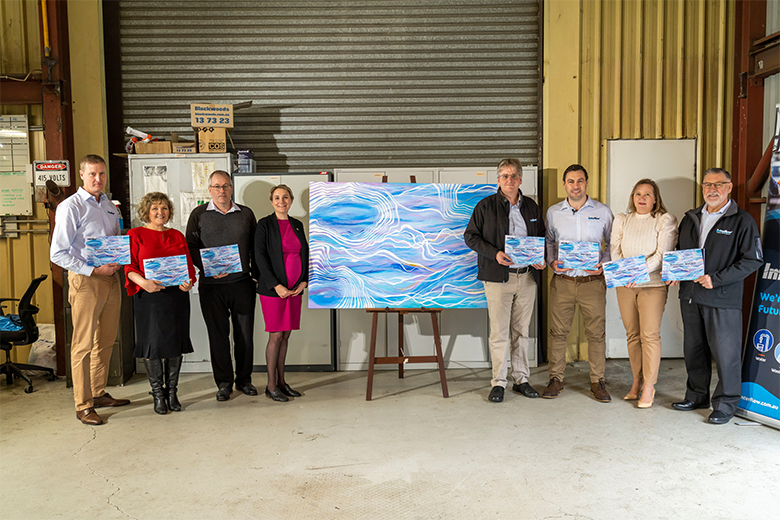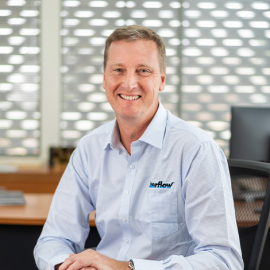
There are benefits for everybody – for customers, First Nations people, communities, stakeholders, its people and the business itself – from Interflow’s Reconciliation Action Plan.

A successful future for businesses in today’s commercial environment, says Interflow’s Executive Manager HSE Adrian Smith, involves much more than simply doing business. It’s about delivering on a purpose and improving the lives of everybody with whom the organisation comes in contact.
For Interflow, which provides water services from the far north of Queensland to the Pilbara region in Western Australia and to New Zealand and the southern reaches of Tasmania, this includes its people, suppliers and communities across the nations.
One vital ingredient in the recipe for success is the organisation’s Reconciliation Action Plan (RAP), Smith says. It’s a framework for knowledge, learning, processes and initiatives that benefit everybody in and around the business.
Interflow is currently 12 months in to the Reflect RAP journey, which helps shape how the organisation will engage with reconciliation.
But the RAP is so much more than that, Smith says.
“The three key focus areas for us from a business perspective involve encouraging cultural respect, unlocking Aboriginal and Torres Strait Islander talent, and developing partnerships,” he says.
“We want to attract Indigenous people, better appreciate and understand our Indigenous communities and further develop our supply chain.”
“But most importantly, we know it’s simply the right thing to do. The feedback we’re getting from our people is very positive, because every business has a role to play in reconciliation.”
RAP is a learning journey
Australia’s First Nations people are a part of the oldest continuing living culture in the world. The more stories Smith hears about the way they have interpreted and managed the land during their 65,000-year custodianship, the more he realises how much can be learned from that knowledge.
“There is a lot we can all learn from our First Nations people,” he says.
“Governments are starting to step up and listen and learn a little more. A recent example is that some state governments are employing or consulting with Indigenous experts to understand how to practice better land management, such as the NSW Rural Fire Service looking into options around hazard reduction burns to prevent the environmental disaster we experienced on the east coast in 2019.”
“The connection we have is water. Water is extremely important to us as a business. But we’re not going to sit back and say we’re experts and we know everything. This RAP process so far has taught us that we really need to take the time to listen to feedback we’ve been getting from Indigenous people. If we listen, we’ll learn and constantly evolve.”
Initiatives connected to the Interflow RAP program include leadership cultural awareness sessions hosted by Wurundjeri Elder, Uncle Bill Nicholson Junior. Uncle Bill explained the impacts the business’s projects could have on sacred lands and on how Interflow can better engage Aboriginal and Torres Strait Islander groups and contractors.
Interflow has partnered with Supply Nation, so far providing over $1.5 million to businesses certified by the Indigenous business facilitator.
The business also partnered with majority-owned Aboriginal and Torres Strait Islander business, Indigenous Project Services Australia, to deliver a five-kilometre sewer reticulation pipeline on the Royal Australian Air Force base in Amaroo, Darwin.
RAP brings pride and loyalty
One of the biggest responsibilities of the 20-strong RAP Working Group – itself designed with a robust governance structure that includes internal and external parties so that the organisation is resilient to growth and change – is to communicate the RAP’s purpose to the organisation and beyond, says Frank Phillips, Interflow’s Executive General Manager QLD/WA/NZ.
“We’ve got a very eager working group,” Phillips says. “We’ve found a rhythm and empowered everyone in the group to be champions for the RAP, and to make sure the entire organisation really embraces it.”
“And it’s not just about the land. Up until 1970, Indigenous kids were being taken off their families. Yet so many of us, because of a lack of education around this in school and elsewhere, have little idea about what really happened.”
The education that comes from exposure to the RAP program, knowledge around a culture that is so integral to the essence of what it is to be Australian, is highly valued by Interflow’s people, as it is by people within all businesses that are on the RAP journey.
It brings a sense of pride and achievement, Smith says, and helps the business and its stakeholders evolve toward a new future.
“We’re on a journey,” he says. “That journey is towards reconciliation. But it’s also about taking the opportunity to understand a vital culture, and to bring others along on that journey.”
“A lot of people in the business are coming forward and putting their hands up to be part of this. While we are not experts and we don’t have all the answers, the intention is to help and support people along on that journey.”
Phillips agrees, saying the value of the RAP process is actually quite personal and simple.
“To understand this better, it will make you a better person,” he says. “It will make you more balanced and knowledgeable, and it will help you develop a much better understanding of a culture that is a part of all of our lives.”
Why is Interflow putting so much effort into getting the Reflect RAP process right? Because it matters, Smith says. It matters that as many businesses as possible become a part of the solution to First Nation people being the most disadvantaged in Australia.
“This is not a tick-a-box for Interflow,” he says. “It fits within the bigger picture of our diversity and inclusion strategy, from a people and capability perspective. At the same time, it makes real business sense and should have a far broader, and very positive, effect.”
“From our Board, Managing Director and leadership team, it’s something we want to truly understand, and our people are telling us they want to come along on the journey.”
As Interflow’s Reflect RAP document says, “We aim to achieve the most sustainable outcomes for our customers and our communities. We respect the land on which we operate and have led the development of world-class trenchless technologies that eliminate or reduce the need for excavation.”
“Everything we do is underpinned by our core values of honesty, respect, reliability and competence. Our values are the cornerstones of our success and are embedded in our DNA. They inform the way we do business with ourselves, and others.”
Interflow’s RAP commitments
A number of commitments and opportunities – many already delivered upon – have been identified through Interflow’s RAP process.
They include:
- Establish and strengthen mutually beneficial relationships with Aboriginal and Torres Strait Islander stakeholders and organisations
- Build relationships through celebrating National Reconciliation Week
- Promote reconciliation through our sphere of influence
- Promote positive race relations through anti-discrimination strategies
- Increase understanding, value and recognition of Aboriginal and Torres Strait Islander cultures, histories, knowledge and rights through cultural learning
- Demonstrate respect to Aboriginal and Torres Strait Islander peoples by observing cultural protocols
- Build respect for Aboriginal and Torres Strait Islander cultures and histories by celebrating NAIDOC Week
- Improve employment outcomes by increasing Aboriginal and Torres Strait Islander recruitment, retention and professional development
- Increase Aboriginal and Torres Strait Islander supplier diversity to support improved economic and social outcomes
Comment below to have your say on this story.
If you have a news story or tip-off, get in touch at editorial@governmentnews.com.au.
Sign up to the Government News newsletter
Anthony Gleeson on: Victorian infrastructure set to fail as climate change bites: report
Sue Phillips on: 15 councils participate in SA emissions reduction trial
Garth Daddy on: War memorial contracts fudged, audit finds